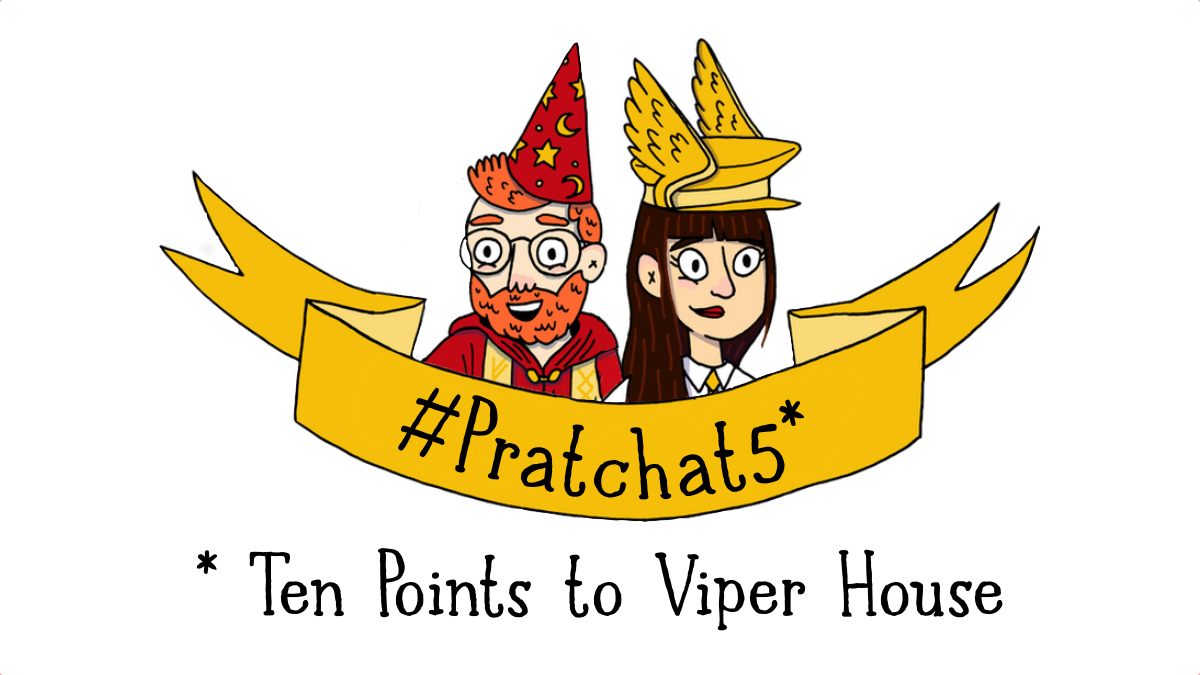In episode five, comedian Richard McKenzie joins us to discuss that rare beast, a Discworld tale that stars no wizards, witches, watches or Death, and isn’t part of any of the ongoing storylines: Pyramids! Terry Pratchett’s seventh Discworld novel, published in 1989, it’s chock-full of jokes, footnotes, gods and great characters – but we’ll see almost none of them ever again…
Pteppicymon XXVIII – Teppic for short – is heir to the throne of the ancient river kingdom of Djelibeybi. But the kingdom is broke, having spent its money on pyramids, and in order to give him a profession, Teppic is sent to the best school on the Disc: the Assassin’s Guild in Ankh-Morpork. Seven years later he’s just taken his final exam when his father dies. Teppic is now King (and God) of Djelibeybi earlier than planned – and after so long away, he finds the ancient traditions of his homeland stifling. Can even the King challenge the authority of the kingdom’s high priest, Dios?
Though it features none of his most beloved characters, Pyramids is nonetheless a favourite among Discworld fans – not least because the first quarter of the book takes us into the classrooms of Ankh-Morpork’s most famous guild. What do you think of this tale of tradition, family and mathematics gone wrong? Let us know! Use the hashtag #Pratchat5 on social media.
Podcast: Play in new window | Download (Duration: 2:00:00 — 55.0MB)
Guest Richard McKenzie is a comedian best known for his storytelling style. Though he rarely performs standup anymore, he hosts trivia twice a week, on Thursdays and Sundays, at the Cornish Arms on Sydney Road in Brunswick, Melbourne. Make sure to use a Pratchett pun in your team name if you go!
You can read the full show notes and errata for this episode on our web site.
Our next book, for our April 8th episode, takes us outside the Discworld – and indeed the fantasy genre – for 2012’s tale of Victorian London: Dodger! Joining us to talk about toshers, geezers and peelers is a man who’s no stranger to fancy words, and better known by his initials: crypto-cruciverbalist and former Letters & Numbers dictionary master, David Astle! We’ll be recording on March 24th, so get your questions in before then if you’d like us to answer them on the podcast. You can use the hashtag #Pratchat6 to ask them via social media. (And check out the Episodes page if you want to see a bit further into our future schedule!)


Re: the timeline. The main bits of evidence for it being in the present is the Ankh Morpork stuff being recognisably now. The thing that puts it 100 years ago is the shared characters (particularly the philosophers) with Small Gods.
This is somewhat addressed in Thief of Time. “Seen through her business eye, history was very strange indeed. The scars stood out. The history of the country of Ephebe was puzzling, for example. Either it’s famous philosophers lived for a very long time, or they inherited their names, or extra bits had been stitched into history there. The history of Omnia was a mess. Two centuries had been folded into one, by the look of it, and it was only because of the mind set of the Omnians whose religion in any case mixed the past and future with the present that it could possibly have passed unnoticed.” p157 (out of 316 if page numbering issues happen)
So the answer to whether it took place now or 100 years ago is probably “both.” Blame the history monks.
Thanks Armcie! We’ll have to revisit this when we get up to Small Gods and Thief of Time, but it also helpfully explains why some of the Djelibeybatian characters are confused about whether it was the Century of the Fruitbat or Century of the Cobra!
I know I’m chiming in late, but I agree that it’s mostly the philosophers that date the story as older. Aside from the History Monks (to whom the fandom basically attributes all anachronisms and inconsistencies related to time), this can also be explained to the time shenanigans catapulting Pteppic, Ptracy and You Bastard into some kind of time pocket 100 years earlier in Ephebe.
Can’t wait for you guys to get to Small Gods!
Pratchat 05 Pyramids | Visible Procrastinations
[…] Episode 5 – Ten Points to Viper House […]
Surprisingly for a one-off novel, this is still one of my favorite books of the entire Discworld series. It doesn’t benefit from the character development and worldbuilding that, say, Night Watch does nor does it include a great big ensemble assembly like The Last Hero. I really enjoyed the Assassin’s Guild test, and I think Pyramids is where Pratchett starts to take Discworld away from traditional fantasy stories, especially in how he highlights the contrast between Ankh-Morpork and more exotic Circle Sea nations. It feels more cosmopolitan than Sourcery or Equal Rites, somehow, in a way that Pratchett didn’t really get back to until Moving Pictures and Reaper Man.
[Apologies that I have come late to this particular episode of the podcast]. I only got around to listening this week after finally re-reading the book over the past few weeks]
My question: Did you consider the meaning of the name “Dios”? It is literally the Spanish word for god (and a modernization of the Latin word.). I wonder why Pterry chose this particular name. It can’t have been coincidence.